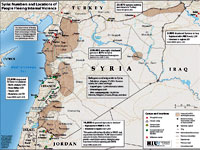Obama, Putin will try to come closer on Syria but unlikely to succeed – pundits

(Interfax – June 17, 2013) Analysts believe that the leaders of Russia and the United States at their bilateral meeting in the framework of the G8 summit in Northern Ireland are likely to pay most of their attention to the Syrian conflict and preparations for the Geneva conference on Syria.
“I believe with a probability of 60 percent or even more that issues related to the Syrian conflict will be in the center of the Russian-American dialogue. They worry Washington to the greatest extent both from the viewpoint of the beginning direct arms deliveries to the opposition and in the context of preparing the future Geneva conference on Syria,” Duma deputy and expert on Russian-U.S. relations Vyacheslav Nikonov has told Interfax.
In his opinion, the upcoming meeting of President Vladimir Putin and U.S. President Barack Obama does not mean that all interested sides will succeed in promptly agreeing on the forum on Syria.
“I believe that the sides will confirm their intentions to bring positions closer on the Geneva conference. But I don’t think this will happen precisely in Northern Ireland,” he said.
The Syrian issue will definitely become the main one at Putin’s upcoming meeting with Obama and Moscow should bear it in mind that most G8 members are on Washington’s side with insignificant reservations, first vice president of the Center for Political Technologies Alexei Makarkin believes.
“It will be a one-on-one meeting of the presidents of the two countries, of course. But it is a meeting in the context of G8. And here positions are very clear. Seven countries on one side and one – on the other. In this case the approach of the United States differs little from the approaches of France or Great Britain. Here Russia will have to face the consensus approach of most G8 members,” Makarkin told Interfax.
In his opinion, the chances of compromise are minimal.
“I don’t think either side will back on its principled approach. Therefore one should not cherish any hopes that the G8 summit or the meeting of the two presidents can change anything on the Syrian issue,” the expert said.
Makarkin said that such forecasts stem from serious differences between Russia and the United States over Syria.
“Moscow and Washington are going further and further apart on this problem. Americans have decided to deliver arms to the Syrian opposition and seriously consider the question of establishing a no-fly zone over Syrian territory, at least on a limited scale, without taking the matter to the UN Security Council,” he said.
The differences of approach also affect preparations for the Geneva conference, he said.
“Americans demand the ouster of [Syrian President Bashar] al-Assad and in the very nearest future. Russia does not deny, though, that the Syrian president will leave one day. But Moscow does not intend to exert any influence or pressure on him,” he said.
“The situation around Syria is growing more complicated and Russia is most likely to place the responsibility on Americans who announced arms deliveries. Given the contradictions between global players the convocation of the conference itself is under threat. Even if the forum does take place – and one cannot be sure about that – it will hardly produce any results,” Makarkin said.
